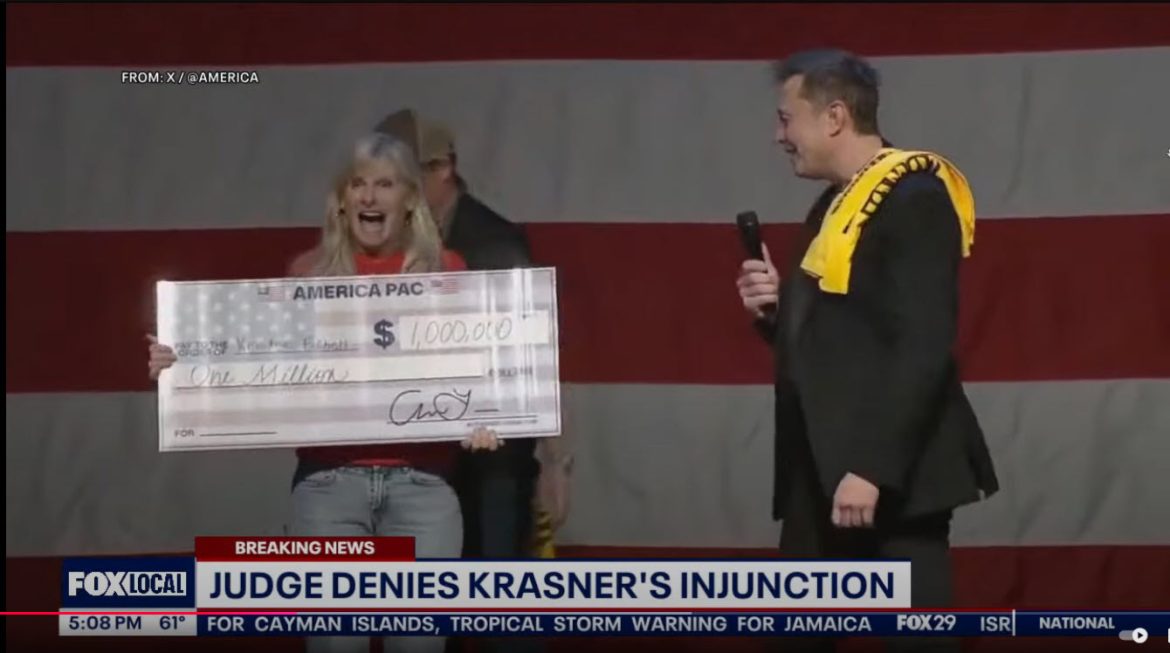Elon Musk’s political action committee (PAC) is legally permitted to proceed with its high-profile $1 million-a-day voter sweepstakes in swing states, following a ruling by a Pennsylvania judge. The controversial sweepstakes, which Musk’s PAC has promoted to encourage voter turnout in the days leading up to the presidential election, was challenged by Philadelphia District Attorney Larry Krasner, who argued that it constituted a scam and violated state election law. However, Common Pleas Court Judge Angelo Foglietta ruled in favor of Musk’s PAC, allowing the sweepstakes to continue through Election Day.
Judge Foglietta issued the ruling after hearing arguments from Musk’s legal team, who contended that the sweepstakes does not violate any laws, as the winners are not selected randomly. Instead, Musk’s attorneys argue that the recipients of the $1 million prizes are predetermined and serve as paid spokespeople for Musk’s political committee, America PAC. In Monday’s court hearing, Musk’s lawyer Chris Gober emphasized that the sweepstakes recipients were chosen intentionally, with careful vetting to ensure alignment with the PAC’s values and messaging.
“The $1 million recipients are not chosen by chance,” Gober said, countering Krasner’s allegations that the sweepstakes was misleading and improperly influenced voters. Gober further clarified that the PAC already knows the identities of the final two recipients, with one to be announced in Arizona on Monday and the other in Michigan on Tuesday, Election Day.
Chris Young, director of America PAC, provided further insight during his testimony, explaining that the sweepstakes recipients undergo a vetting process. According to Young, each recipient is evaluated to confirm they align with the PAC’s values and can effectively advocate for its political mission. “We feel out their personality and ensure they’re someone whose values align with the group,” Young explained, adding that this approach ensures the recipients genuinely represent the PAC’s principles.
Despite the judge’s ruling, District Attorney Krasner has remained vocal in his opposition, expressing concern that the sweepstakes could be misleading to voters. Krasner initially requested an injunction, claiming that the sweepstakes might influence voting behavior in key swing states unfairly. He raised questions about the transparency of the process, suggesting that the sweepstakes could create a distorted perception among voters. Krasner’s office released a statement criticizing the ruling and reiterating his view that the campaign is a “manipulative scheme” designed to sway public opinion with substantial financial incentives.
Musk’s PAC, America PAC, has defended the initiative as a legitimate campaign strategy aimed at engaging voters and promoting its political message. The PAC has been heavily investing in swing states where the presidential race is expected to be highly competitive, with Arizona and Michigan being among the top priorities in its outreach efforts. Musk’s legal team asserts that the sweepstakes represents a modern approach to campaigning and underscores the PAC’s dedication to mobilizing voters who resonate with its platform.
Political analysts and legal experts are weighing in on the implications of the judge’s decision. Some argue that while Musk’s approach is unconventional, it does not appear to violate campaign finance laws or election regulations due to the intentional selection of recipients. “The court has upheld that intentional selection doesn’t equate to chance or lottery-style giveaways, which are regulated differently,” says campaign finance expert John Riddle. “As long as the PAC adheres to its process of vetting recipients as spokespeople rather than random winners, it seems to operate within legal bounds.”
Critics, however, argue that the sweepstakes raises ethical concerns. Some contend that the scale and visibility of the sweepstakes could influence voter perception and potentially incentivize participation in ways that traditional political campaigns do not. “When voters see massive cash incentives linked to a campaign, it can blur the lines between grassroots activism and paid endorsements,” comments political ethics scholar Dr. Ellen Hayes. “While technically legal, it does push the boundaries of what’s ethical in political outreach.”
As Election Day unfolds, the impact of Musk’s sweepstakes on voter turnout and perception remains to be seen. For now, America PAC’s high-stakes initiative moves forward, with the final recipients slated to make appearances in critical swing states.
The ruling allows Musk’s PAC to carry on with its unique voter engagement efforts, potentially shaping the strategies of future campaigns as political committees explore innovative approaches to reach voters. Whether Musk’s $1 million-a-day sweepstakes will have a measurable impact on the election outcome is still uncertain, but it has certainly stirred debate about campaign finance practices and the role of incentives in democratic participation.



